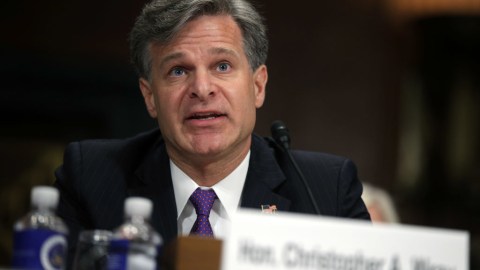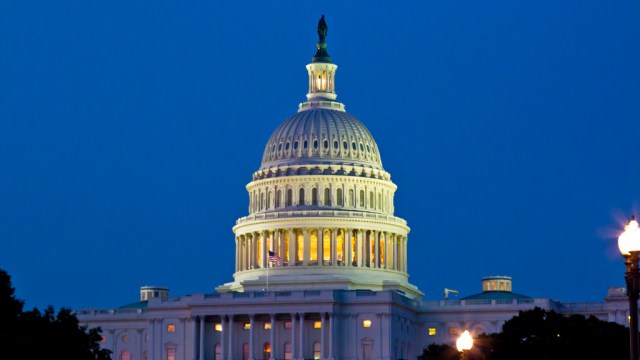FBI director defends “limited scope” of Kavanaugh probe

(Photo by Alex Wong/Getty Images)
- Sen. Kamala Harris (D-CA) pressed Wray on the Kavanaugh probe during a Senate hearing on Tuesday.
- Wray said the White House had corresponded with the agency about the probe but stopped short of addressing whether or to what extent the White House limited the investigation.
- The probe ultimately failed to produce new significant information, a result that expected by Republicans and Democrats, some of whom argued the investigation wasn’t designed to produce new evidence.
FBI Director Christopher A. Wray told Senators on Wednesday that the agency’s investigation into sexual assault allegations against recently confirmed Supreme Court Justice Brett Kavanaugh was “limited in scope” and “followed standard procedures.”
The Kavanaugh probe included interviews of 10 people associated with Kavanaugh or his primary accuser, Christine Blasey Ford. It ultimately failed to produce any significant new information. That was the expected result for Republicans, who struck a chord with right-leaning Americans by framing the national debacle as a calculated smear campaign by Democrats. President Donald Trump went so far as to tell Kavanaugh, “You, sir, under historic scrutiny, were proven innocent.”
Meanwhile, Democrats have said the investigation wasn’t designed to produce new evidence and have questioned why FBI agents didn’t interview new witnesses who came forward in the weeks after the story broke. Ford’s lawyers said they were “profoundly disappointed” that those directing the probe “were not interested in seeking the truth.”
After the Senate Judiciary Committee recommended opening an FBI investigation, Trump ordered the probe but said it “must be limited in scope and completed in less than a week.” He later seemed to walk back the conditions, saying the agency would be allowed to interview whomever it wanted. However, a senior official in the administration reported that the president’s comments didn’t change the scope of the FBI’s investigation.
Wray defends the agency, sidesteps key question
At Tuesday’s hearing, Sen. Kamala Harris (D-CA) asked Wray whether the FBI was given full discretion to pursue the background investigation as it sees fit, or whether the White House had limited the scope of the probe.
“Unlike most investigations like the sort that you and I and [Democratic Sen. Doug Jones of Alabama] have all been familiar with—traditional criminal investigations, national security investigations—a background investigation is very different,” Wray replied. “Our only authority is as requested by the adjudicating agency—[which] in this case is the White House.”
FBI criminal investigations are conducted independently without direction from the White House, while FBI background checks can be directed and ordered by the administration.
“Our supplemental update to the previous background investigation was limited in scope, and that is consistent with the standard process for such investigations going back quite a long ways,” Wray said.
Harris asked whether Wray received written direction from the White House. Wray said he wasn’t sure but would assume some written correspondence between the White House and agents would have taken place. Harris later asked whether Wray knew who determined that Ford, Kavanaugh, and dozens of other witnesses would not be interviewed in the probe.
“As is standard, the investigation was very specific in scope, limited in scope, and that is the usual process, and that my folks have assured me that the usual process was followed,” Wray said.
Harris also asked if the FBI examined whether Kavanaugh may have lied to Senators in his public testimony.
“That’s not something I could discuss here,” Wray said.





